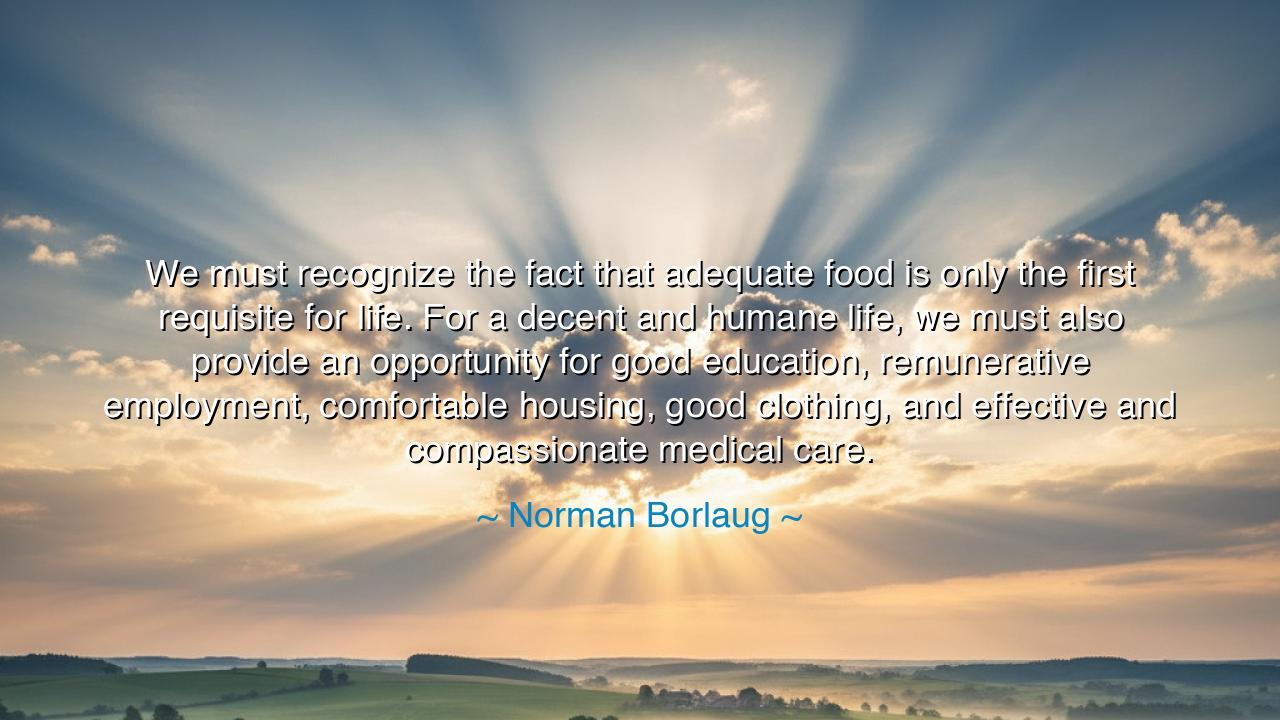
We must recognize the fact that adequate food is only the first
We must recognize the fact that adequate food is only the first requisite for life. For a decent and humane life, we must also provide an opportunity for good education, remunerative employment, comfortable housing, good clothing, and effective and compassionate medical care.






Hear the words of Norman Borlaug, the man called the father of the Green Revolution, who fed nations and stilled the pangs of famine: “We must recognize the fact that adequate food is only the first requisite for life. For a decent and humane life, we must also provide an opportunity for good education, remunerative employment, comfortable housing, good clothing, and effective and compassionate medical care.” In this statement lies not only the wisdom of a scientist, but the heart of a sage. He reminds us that survival is not the summit of existence; to live as human beings, we must also flourish, and flourishing requires more than bread alone.
The origin of these words arises from Borlaug’s lifelong labor against hunger. In the mid-20th century, his work in developing high-yield crops and agricultural methods saved hundreds of millions from starvation in Asia, Latin America, and Africa. Yet Borlaug, though a hero of food, knew that full bellies were not enough. To give adequate food is to prevent death, but to give education, employment, housing, and medical care is to create life abundant, dignified, and whole. He saw that the fight against hunger must be linked to the greater struggle for justice and humanity.
The ancients themselves understood this layered truth. In the wisdom of the Greeks, the concept of eudaimonia—true human flourishing—was not merely to survive but to live in accordance with virtue, supported by the necessities of community. Likewise, the prophets of old declared that man does not live by bread alone. Food is the foundation, but the house of life must be built upon it: shelter, learning, health, dignity, and care. Borlaug’s words carry forward these ancient teachings into the modern age.
Consider the story of postwar Japan. In the ruins of 1945, the people faced famine, homelessness, and despair. The Allied relief efforts brought food to prevent starvation, but the nation’s rebirth came not from bread alone. Schools reopened, industries were rebuilt, housing was provided, and health systems were strengthened. Within a generation, Japan rose from devastation to prosperity, not because its people had only enough to eat, but because they were given the chance to rebuild the full fabric of human life. This is Borlaug’s truth embodied in history.
The meaning of his words is a call to compassionate responsibility. To feed the hungry is the first act of justice, but to stop there is to leave humanity half-saved. Without education, the mind starves; without employment, the spirit withers; without housing and clothing, dignity is stripped away; without medical care, life is fragile and cruel. Borlaug urges us to look beyond mere survival toward a vision of society where every person has the tools to rise, to grow, to dream.
The lesson is clear: to build a decent world, we must labor not only for subsistence but for wholeness. Governments, communities, and individuals alike must reject the false comfort of minimal charity and instead embrace the full measure of justice. Do not ask, “Have they enough to survive?” but, “Do they have what they need to live fully, as fellow human beings?” For the difference between the two is the difference between existence and life, between despair and dignity.
Practical action flows from this wisdom. Support not only food banks, but also schools, clinics, and programs that create lasting opportunities. When aiding others, think beyond the meal of today to the education, shelter, and health that sustain tomorrow. Advocate for systems that treat people not as mouths to be fed, but as lives to be nurtured. And in your own life, extend generosity not just to prevent suffering, but to foster dignity in all.
Thus, Borlaug’s words endure as both a warning and a vision. They remind us that survival alone is a meager goal for humanity, unworthy of our potential. Let us, then, strive for more: a world where all are fed, yes, but also taught, employed, housed, clothed, and healed. For in such a world, we do not merely survive—we truly live. And in this, the legacy of Norman Borlaug becomes not only the Green Revolution of fields, but a revolution of the human heart.






AAdministratorAdministrator
Welcome, honored guests. Please leave a comment, we will respond soon